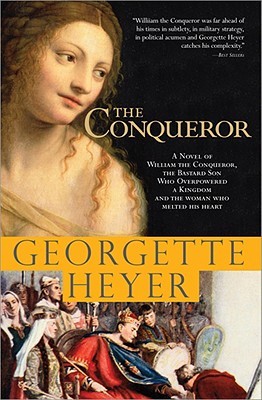The Conqueror by Georgette Heyer. 1931/2008. Sourcebooks. 469 pages. [Source: Review copy]
First sentence: There was so much noise in the market-place, such a hubbub of shouting and chaffering, that Herleva dragged herself to the window of her chamber and stood peeping down through the willow-slats that made a lattice over the opening.
Premise/plot: The Conqueror is a historical novel about William the Conqueror. It begins with his birth and ends with his coronation in December of 1066. It is not told from his perspective; it is told from the perspective of one of his loyal men--servants, warriors--Raoul.
My thoughts: Would The Conqueror conquer me or would I conquer The Conqueror? I knew from the start it would be a close call. Indeed it was. If I have biases, I thought they would work in favor of The Conqueror. I love history. I love historical fiction. I often enjoy novels about 'the royals.' It was also written by Georgette Heyer. I love and adore her, right?!?! (I can honestly say that if this was the first Heyer novel I picked up, I would never pick up another one.)
I didn't care about the characters for the most part. I don't blame Raoul, not really. One developed character cannot make a good novel. And essentially that's what we get. We may learn enough about Raoul to find him believable as a human being, but, the other characters not so much. Duke William, aka William the Conqueror remains distant, disconnected, unknowable, unlikable. Scenes vary--alternate--from battle scenes to groups of his men sitting around talking about how distant the Duke is. And perhaps that is how it should be. He's the ruler of Normandy. He's an illegitimate son. He's not overly liked or popular in some circles. Every person is a potential threat, a potential enemy, a potential betrayer. Raoul has proved himself loyal where other men had failed him. Raoul is easily part of his inner circle, but Raoul isn't necessarily an equal-equal either.
The one relationship I liked was between Raoul and Edgar.
Duke William has one thing--possibly two--on his mind. He's an ambitious, greedy man who lusts for the throne of England from a relatively early age. I'm not convinced that Heyer wants us to like him. Actually, I'm not sure of what Heyer intended. I doubt her intentions were to put readers to sleep. I doubt her intentions were to make a 470 page novel feel like 2,000 pages. Were we supposed to be cheering William on throughout the novel? Were we supposed to find the battle scenes thrilling? And his quest to be the next king of England noble and admirable?
I felt relief upon finishing the novel.
© 2018 Becky Laney of Becky's Book Reviews


1 comment:
I do agree with you on this Becky. Georgette Heyer's historical novels are nowhere near as enjoyable as her regency romances. I once tried to read 'Royal Escape', and gave up after a chapter or two.
Post a Comment